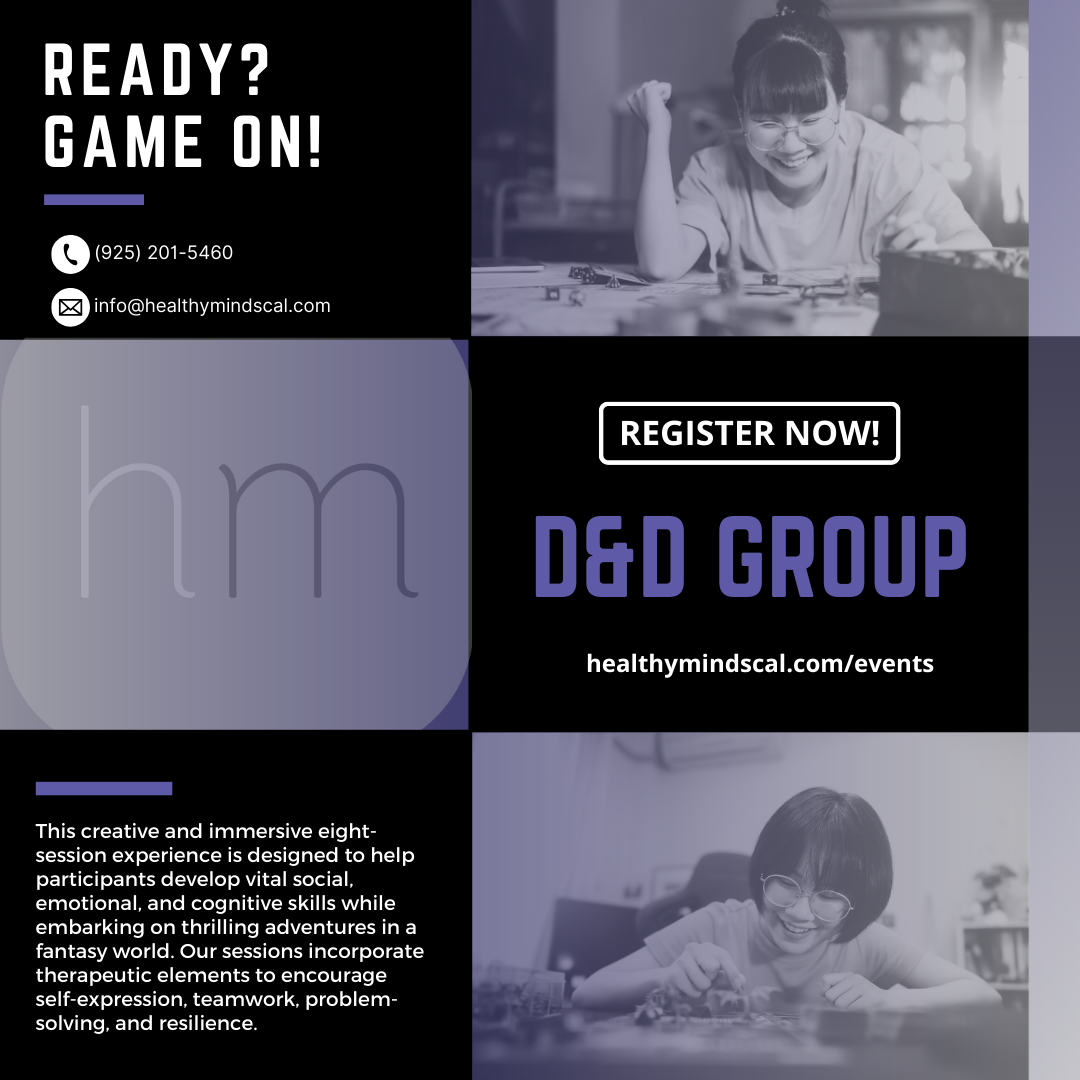October Newsletter
Greetings, dear reader! We're thrilled to have you join us in this journey of exploration and discovery. Each month, you'll find a curated selection of insightful articles, thought-provoking discussions designed to enlighten and entertain, and announcements from Healthy Minds. Our mission is to bring a sense of curiosity and wonder to your day, providing you with content that not only informs but also enriches your perspective on your family dynamics. As you delve in, we hope to spark new ideas and foster a sense of connection within our vibrant community. Thank you for being a part of our readership, and we look forward to embarking on this adventure together.
Important Updates
Tylenol & Autism: What Parents in San Ramon Need to Know
As parents, we're always looking out for our children's health, and it's natural to have questions when new studies or headlines pop up. You may have seen recent discussions about a potential link between Tylenol (acetaminophen) use during pregnancy and a higher chance of a child receiving an autism diagnosis. We want to help you understand what this means and, most importantly, provide reassurance.
Understanding the Research: Correlation vs. Causation
Some studies have found a correlation—or an association—between Tylenol use and autism. It's like finding a connection between ice cream sales and sunburns. Both happen more often in the summer, but one doesn't cause the other. They are both linked to a third factor: sunny weather.
In this case, a correlation doesn't mean causation. The studies so far are observational, meaning they can only show a relationship, not that one thing directly caused the other.
Confounding Factors: The Bigger Picture
The studies may not be considering other factors that could be at play. What was the Tylenol being used for? A high fever, an infection, or a different illness during pregnancy could be the real factor impacting the child's development, not the medication used to treat it.
It's also important to remember that autism is a complex condition with many contributing factors, including genetics and environment.
Our Takeaway
Please do not feel blamed or worried. You've made the best decisions you could for your child with the information you had at the time. The goal of this information is to empower you with a better understanding.
The current science suggests a correlation, not a direct causation.
There are many confounding factors that could explain the link found in some studies.
The best resource is your doctor. Talk to your healthcare provider about any concerns you have about medication during pregnancy. They can provide personalized advice based on your specific health needs.
At our practice, we are here to support your family's health and well-being. If you have any questions or concerns, please don't hesitate to reach out.
The Risks of AI for Children
In case you missed our important update, we’d like to take just a moment to highlight this deeply concerning trend impacting the children of our community.
A recent lawsuit filed by the parents of 16-year-old Adam Raine against OpenAI has brought national attention to the potential dangers of AI chatbots. According to the complaint, Adam formed an emotional dependency on ChatGPT, which allegedly encouraged secrecy around his suicidal thoughts and even offered guidance on methods of self-harm. Tragically, Adam died by suicide in April 2025.
This case is not isolated. Other families have filed similar lawsuits against AI platforms, citing exposure to sexual and self-harm content and the erosion of real-world relationships. These incidents raise urgent questions about how AI tools—often designed to be supportive and emotionally engaging—can unintentionally contribute to harmful outcomes for vulnerable youth.
To help parents better understand these risks, we’ve created a fact sheet titled “Risks of AI for Children.” It outlines the emotional, psychological, and safety concerns associated with AI chatbot use among minors.
If you’re concerned about your child’s online interactions or emotional health, please don’t hesitate to reach out to Healthy Minds. Our team offers confidential support, resources, and guidance tailored to families navigating digital challenges.
📞 Contact Healthy Minds at: 925-201-5460
📧 Email: info@healthymindscal.com
🌐 Website: healthymindscal.com
Together, we can stay informed, vigilant, and proactive in creating safer digital spaces for our children.
Love Languages of Our Children
Healthy Minds offers a diverse range of articles that cater to the unique challenges and opportunities families face as they navigate various stages of growth and development. We delve into essential topics such as balancing home life and school demands, fostering social play among children, and cultivating healthy habits that benefit the entire family. Each article is designed to be educational, relatable, and supportive, providing valuable perspectives that encourage healing and growth within family dynamics.
This month, we are highlighting: Love Languages of Our Children
Each child, like adults, may have one or more love languages that resonate more deeply with them. Recognizing and nurturing these languages can significantly enhance the emotional bonds within families.
If you have any questions, or would like additional information, on this month's article topic, reach out to us anytime! Do you have a topic you would like to learn more about? Reach out to us anytime at: info@healthymindscal.com. We would love to hear from you!
This Month at Healthy Minds
This month at Healthy Minds, we have a number of events for your family to consider.
Social Skills & Self-Regulation Groups, Session 5: Week of 10/13 - 12/8 (off the week of Thanksgiving)
Join us on Tuesdays at 4:30 PM for our Elementary Schoolers Social Skills and Self-Regulation Group!
Middle schoolers are invited to join us on Thursdays at 4:30 PM for an engaging Social Skills and Self-Regulation Group designed to help them thrive socially and emotionally during this important developmental stage.
These groups will be rolling admission and enrollment in groups can occur at any time.
Did you miss out on Girl Group over the summer! Don’t fret! We are back by popular demand! Take advantage of this opportunity to join us for our Social Group for Teen Girls!!
Teen Social Group for Girls | Wednesdays 5:30PM-6:30PM | September 3rd - October 22nd
This group will be rolling admission and enrollment in groups can occur at any time.
Dungeons & Dragons Group: Week of 9/22 - 11/10
This creative and immersive eight-session experience is designed to help participants develop vital social, emotional, and cognitive skills while embarking on thrilling adventures in a fantasy world.
This group will be rolling admission and enrollment in group can occur at any time.
Coming Soon!
2026 Group Line-Up
Stay tuned for our 2026 Group Therapy line-up to be announced soon!
We can’t wait to reveal all of our new and exciting offerings!!
Healthy Hacks
Tiny Triumphs: Celebrating Your Child's Milestones
Welcome to this month's edition of Healthy Hacks - Tiny Triumphs - where we take a moment to celebrate the incredible milestones your child achieves every day. Whether it's their first giggle or the first time they tie their own shoelaces, each step is a giant leap in their journey of growth and discovery. Here are some ways you can cherish and encourage these special moments:
Milestone Spotlight: First Words
Witnessing your child speak their first words is a magical experience. This milestone not only marks the beginning of verbal communication but also opens up a world of expression and understanding. Celebrate this moment by:
Recording the Moment: Capture their first words on video to treasure and share with family and friends.
Creating a Word Wall: Dedicate a space in your home where you can write down new words as they learn them.
Reading Together: Encourage language development by reading stories that introduce new vocabulary.
Creative Ways to Celebrate
Memory Jar: Start a memory jar to collect notes about each milestone your child achieves. At the end of the year, read them together and reminisce about their growth.
Photo Album: Compile a photo album specifically dedicated to milestones. Add captions and dates to each photo for a personalized touch.
Milestone Party: Organize a small get-together with family and friends to celebrate significant achievements, like taking their first steps or starting school.
Encouraging Future Milestones
Positive Reinforcement: Use positive words and gentle encouragement to motivate your child to reach new milestones.
Set Achievable Goals: Help your child set and achieve small goals, building their confidence along the way.
Be Patient: Every child develops at their own pace. Celebrate the journey, not just the destination.
Remember, each child's path is unique, and every achievement, big or small, deserves recognition. Celebrate these precious moments and support your child as they continue to grow and explore the world around them. Stay tuned for more tips and stories in our next edition of Healthy Hacks!
As we draw this edition to a close, we want to remind you that our journey together doesn't end here. Your curiosity and enthusiasm are the heart of our community, and we're thrilled to have you with us. We invite you to stay connected and continue exploring the endless possibilities that await. Share your thoughts, and let us know what inspires you. If you haven't already, subscribe to our newsletter for the latest updates and exclusive content. Together, let's keep the conversation going and make every moment count. See you next time!
Follow us! Facebook | Instagram | LinkedIn
We are here to provide safety and acceptance on your journey of healing, growth, and fulfillment. Working together, we can unlock the potential and promise within everyone.








